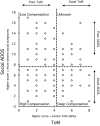Good social skills despite poor theory of mind: exploring compensation in autism spectrum disorder
- PMID: 29582425
- PMCID: PMC6334505
- DOI: 10.1111/jcpp.12886
Good social skills despite poor theory of mind: exploring compensation in autism spectrum disorder
Abstract
Background: It is proposed that some individuals with Autism Spectrum Disorder (ASD) can 'compensate' for their underlying difficulties (e.g. in theory of mind; ToM), thus demonstrating relatively few behavioural symptoms, despite continued core cognitive deficits. The mechanisms underpinning compensation are largely unexplored, as is its potential impact on mental health. This study aimed to estimate compensation patterns in ASD, by contrasting overt social behaviour with ToM task performance, in order to compare the characteristics of 'Low' and 'High' Compensators.
Methods: A total of 136 autistic adolescents, from the ongoing Social Relationships Study, completed a range of cognitive tasks, the Autistic Diagnostic Observation Schedule (ADOS) and a self-report anxiety questionnaire. Participants were assigned compensation group status; High Compensators demonstrated good ADOS scores despite poor ToM performance, while Low Compensators demonstrated similarly poor ToM, accompanied by poor ADOS scores.
Results: High Compensators demonstrated better IQ and executive function (EF), but greater self-reported anxiety, compared with Low Compensators. Such differences were not found when comparing individuals who had good versus poor ADOS scores, when ToM performance was good. Other core autistic characteristics (weak central coherence, nonsocial symptoms) did not differentiate the High and Low Compensators.
Conclusions: IQ, EF and anxiety appear to be implicated in the processes by which certain autistic young people can compensate for their underlying ToM difficulties. This tendency to compensate does not appear to reflect the severity of 'hit' for ASD per se, suggesting that well-compensated individuals are not experiencing a milder form of ASD. The construct of compensation in ASD has implications for research and clinical practice.
Keywords: Autism spectrum disorder; adaptation; camouflaging; compensation; compensatory mechanisms; executive function; remediation; theory of mind.
© 2018 The Authors. Journal of Child Psychology and Psychiatry published by John Wiley & Sons Ltd on behalf of Association for Child and Adolescent Mental Health.
Figures

Comment in
-
Autism's existential crisis: a reflection on Livingston et al. (2018).J Child Psychol Psychiatry. 2019 Jan;60(1):111-113. doi: 10.1111/jcpp.12989. J Child Psychol Psychiatry. 2019. PMID: 30556607
References
-
- Abell, F. , Happé, F. , & Frith, U. (2000). Do triangles play tricks? Attribution of mental states to animated shapes in normal and abnormal development. Cognitive Development, 15, 1–16.
-
- American Psychiatric Association (2013). Diagnostic and statistical manual of mental disorders (5th edn). Washington, DC: Author.
-
- Anzures, G. , Goyet, L. , Ganea, N. , & Johnson, M.H. (2016). Enhanced ERPs to visual stimuli in unaffected male siblings of ASD children. Child Neuropsychology, 22, 220–237. - PubMed
-
- Baron‐Cohen, S. , Wheelwright, S. , Hill, J. , Raste, Y. , & Plumb, I. (2001). The “Reading the Mind in the Eyes” Test revised version: A study with normal adults, and adults with Asperger Syndrome or high‐functioning autism. Journal of Child Psychology and Psychiatry, 42, 241–251. - PubMed
Publication types
MeSH terms
Grants and funding
LinkOut - more resources
Full Text Sources
Other Literature Sources
Medical

